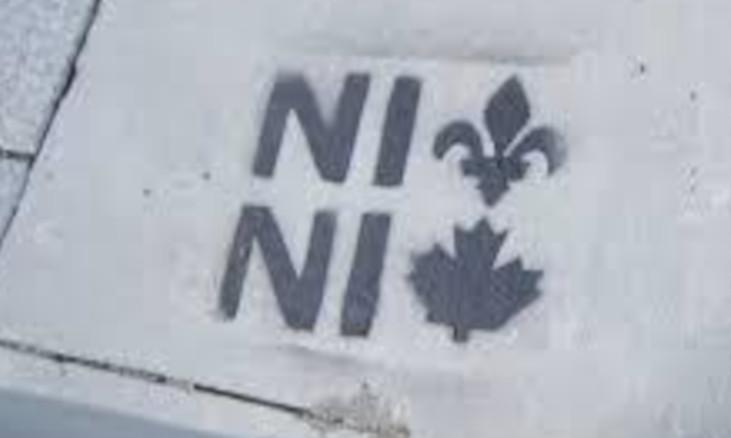By From Embers
A conversation with two anarchists following a workshop they gave at the Montreal Anarchist Bookfair entitled “10 years since the strike: the place of nationalism within militant struggle.” We discuss the history of Quebec nationalism and its influence in anarchist and radical milieus, responsibilities of settlers in anti-colonial struggle and in relating to land, possibilities and uncertain futures opened up by anarchism as a guiding practice, and more.
Further reading:
- « Sauvage », « esclave » et « Nègres blancs d’Amérique » : hypothèses sur le complexe onto-politique québécois
- Keshena Robinson – Québec Redux: Settler Coloniality and Reactionary “Decolonialism”
- Robin Maynard and Leanne Betasamosake Simpson – Rehearsals for Living
- William C. Anderson – The Nation on No Map: Black Anarchism and Abolition
- Tuck and Yang – Decolonization is Not a Metaphor
- Sever – Land and Freedom


Just listened to this and thought the questions raised are definitely provocative and relevant, and thank the host and guests for raising them. I’ve jotted a few thoughts below that came up for me… avoiding the Quebec-specific stuff as I don’t live there.
– People showing up to front lines and complaining that they’re not “anarchist enough” – without knowing the specifics it’s hard to know how to take that. There’s a big discussion to be had about how anarchists should and should not “show up” to indigenous-led blockades and other struggles. Arrogantly demanding that people organize themselves according to anarchist dogma, or somehow expecting that indigenous warriors are anarchists is certainly naive and shitty. The real question is how to navigate the complex terrain of amorphous and divided communities struggling against extractive projects and the state. Where solidarity begins and where it ends. Just because a struggle is led by indigenous people or takes aim at the state doesn’t make it good, just because said people don’t fit neatly into anarchist categories doesn’t make it bad. And just because you’re white and/or a settler doesn’t mean you should keep your mouth shut… but understanding the dynamics of another context takes a lot of time and care, we should all be mindful of our social position in a given situation, and it’s easy to make assumptions and get it wrong. I don’t think anyone can or should develop a set of policies and procedures for good solidarity, it is certainly a process of relationship building, humility, listening, sensitivity and disposition that we have to cultivate in our networks in order to increase our chances of making choices that are both ethical AND strategic (neither purists nor Machiavellians).
– Anarchism as “uncertainty” … this is a theoretical space that feels increasingly tricky for me. I have long subscribed to a similar idea that anarchy is the space where the best and the worst things can happen, a leap of faith into the unknown. I still think this to an extent. And when I speak with liberals about #LandBack, for example, a common refrain is a desire for “certainty” which in this context means something like, “Which legal entities can be negotiated with in order to more smoothly begin resource exploitation in this place?” Native Youth Movement made a compelling argument in the 1990s for resisting the certainty of ownership as a way of attacking the BC Treaty Process, correctly identifying it as a strategy for capitalist expansion, which is currently happening nationwide under Trudeau’s “Reconciliation agenda”.
That said, I think more people increasingly feel we now live in “uncertain times,” amidst major threats to the global neoliberal order (predominantly coming from a resurgent right wing nationalism), as well as the existential threat of climate change and associated events. And while this uncertainty opens up many possibilities for anarchist intervention, I also believe it is leading a lot of people to embrace either reactionary positions or apathetic-passive nihilism.
In this context, I think it’s actually very important for anarchists to emphasize possible futures that are neither technocratic green authoritarianism nor reactionary nationalism … I do believe there’s a way to do this while weaving anti-colonial solidarity into the core of our efforts, allowing for a multiplicity of futures, avoiding blueprints, etc… And while this path still holds a massive amount of uncertainty, it doesn’t throw out the idea of “settler futurity” altogether. Otherwise I worry that the whole thing ultimately funnels back to strategies founded on white guilt and “taking leadership” that have been effectively critiqued by anarchists and indigenous comrades and increasingly appropriated by liberals over the past decade or so.